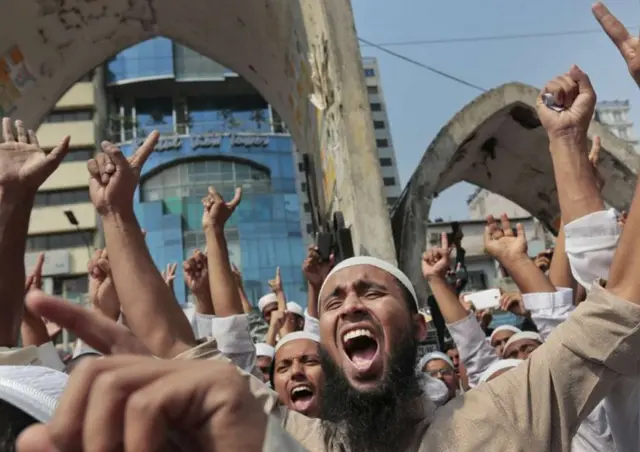When Bangladesh dismissed the Islamic State’s (IS) claim of responsibility for the deadly hostage crisis that gripped Dhaka’s diplomatic zone over the weekend, some questioned if authorities were in denial.
The government instead insisted home-grown militants were behind the attack at an upscale Dhaka restaurant left 28 dead, including 20 hostages, two police officers and six of the attackers. It said the claims by transnational jihadist groups were simply opportunistic grabs at global attention.
Analysts say Prime Minister Sheikh Hasina’s government has a point
Bangladeshi rich kids who grew up to be jihadists
The attack, the worst in a wave of violence waged by radical Islamists in recent years, speaks to a deeper divide within the nation of 160 million – one that has pitted secularists against those yearning for Islamic rule since the country won independence from Pakistan in a bloody war in 1971.
“Most people are not aware of the record, of Bangladesh as having been born of strife,” said Ajai Sahni, a counterterrorism expert at the Institute for Conflict Management in New Delhi. “It is a politically polarised country where many people have been radicalised over decades. It’s going to be a long, uphill task for any government to reverse.”
In recent years, Hasina has cracked down on myriad militant groups, banning many and arresting their leaders. Some were convicted in opaque war-crimes court proceedings of collaborating with Pakistani forces in committing wartime atrocities and were executed. Last month government forces rounded up more than 11,000 suspected militants, petty thieves and criminals in just under a week, leading to allegations of rights abuses and a crackdown on the political opposition.
‘We had no inkling’: Son of Bangladesh ruling party leader among suspected gunmen in Dhaka attack
Instead, the blunt and heavy-handed actions have left domestic radical groups frustrated, driving them to find new role models and ways of boosting their profile and grabbing public attention, analysts said.
Extremist groups based in the Middle East and looking for new recruits have eagerly obliged. A day after the Dhaka restaurant attack, the regional branch of al-Qaeda first claimed responsibility. Then, the IS group said it was responsible, and offered photographs of the carnage and five of the attackers to back up the claim. IS has claimed many of the individual attacks in Bangladesh since 2013 that targeted the so-called enemies of Islam – atheist bloggers, religious minorities, gay rights activists and foreign aid workers.
Analysts say the attacks may be motivated by international groups like IS. The attackers may also have contacts in Syria or Iraq, or at least connections with intermediaries who can pass along photo evidence to be disseminated.
But the Bangladeshi militant agenda is clearly driven from home, said retired army Major General Abdur Rashid, now working as a security analyst in Bangladesh. The evidence from the attack, he said, supports Hasina’s contention that the Islamic State has no presence in Bangladesh, and that “local forces have done this.”
Bangladesh arrests Islamist militant over gruesome murder of secular publisher
Bangladesh has a grim record of political violence since its birth. It has witnessed the assassination of two presidents, the jailing and execution of political leaders, and 19 failed coup attempts amid a struggle over the nation’s identity and control of its future.
“This is a very bloody and very personal history. It’s not just a question of ideology and political differences. This is personal,” Sahni said.
Analysts worry Hasina is compounding the extremist problem by accusing the main opposition Bangladesh Nationalist Party of backing the militant campaign to destabilise her government.
Hasina’s Awami League Party dates to the secular independence movement led by her father and the country’s first premier, Sheikh Mujibur Rahman, who was assassinated in 1975.
Her main political opponents in the BNP are led by former Prime Minister Khaleda Zia, whose military husband Gen. Ziaur Rahman was also a national leader and was assassinated in 1981.
Hasina’s mistrust of BNP lies in part with the opposition party’s alliance with Jamaat-e-Islami, an outspoken Islamist political party with a vast network of mosques and madrassas that has been banned from contesting elections.
Massive crackdown in Bangladesh raises questions about government’s motive
Cracking down on religious radicals is tricky without risking a political backlash, analysts said. But some said her government is going too far in the other direction, for example, telling atheist writers targeted for attack that she cannot protect them if they offend people’s religious sensibilities.
Authorities have also failed to apprehend perpetrators of past attacks, leading to a climate of impunity.
That has helped feed into frustrations with her government, and given credence to those who say she is against Islam.
“She needs to stop politicising the violence and using it as leverage against the opposition,” said Shehryar Farzi, a South Asia analyst for the International Crisis Group think tank.
“The zero-sum rivalry is allowing one winner to emerge, and that is these jihadi groups.”
(AP)
 简体中文
简体中文

